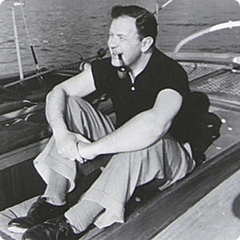 |
 |
 |
 |

From the Collection of Mrs. Joseph Mankiewicz/The Director's View Film Festival
|
 |
"I've been in on the beginning, the rise, peak, collapse, and end of the talking picture."
Joseph Mankiewicz (1909–1993)
Filmmaker
Columbia College 1928
A screenwriter known for polished dialogue and intriguing plots who became a prize-winning producer and director, Joseph Mankiewicz reached the pinnacle of his career when he became the first man to win consecutive Academy Awards for writing and directing—for Letter to Three Wives (1949) and All About Eve (1950). Mankiewicz got his first Hollywood job as a subtitle writer for Paramount in 1929 thanks to his elder brother Herman, who was by then an established screenwriter. Soon graduating to full screenplays, Mankiewicz garnered his first Oscar nomination for 1931's Skippy. The next year he penned the W.C. Fields classics Million Dollar Legs and If I Had a Million; the actor's signature phrase, "My little chickadee," was probably a Mankiewicz coinage. He moved on to MGM in 1933, continuing to write popular comedies before taking up responsibilities as a producer. (After hiring a noted author to pen the film Three Comrades only to find himself revising the script at great length, Mankiewicz observed that "If I go down in literary history, in a footnote, it will be as the swine who rewrote F. Scott Fitzgerald.") Mankiewicz's time at MGM was highlighted by The Philadelphia Story (1940) and Woman of the Year (1942), the first film to team Katharine Hepburn and Spencer Tracy. In 1943 he became a director for Twentieth Century Fox, the studio at which he achieved his unprecedented Oscar feat.
|
 |
 |
 |
 |
In the 1950s Mankiewicz tried his hand at directing both opera and theater in New York between film projects, but never approached his success in Hollywood. He took over directorial responsibilities on the ill-fated Cleopatra (1963), taking 18 months to finish what he had imagined would take 15 weeks, and was blamed, probably unfairly, for the picture's failure. His reputation tarnished, he worked only intermittently as a director in television and film for the remaining decade of his career. His reputation was burnished by the well-received Sleuth (1972), his final film, and in 1986 he received the D.W. Griffith Award for lifetime achievement from the Directors Guild. On the occasion of a 1992 retrospective of Mankiewicz's work, Vincent Canby of The New York Times praised the filmmaker for the "stinging skepticism, the reassuring common sense, the elan and the immense technical virtuosity of his work" as well as his "singular gift for humane, well-rounded, literate dialogue."
Mankiewicz followed his brother Herman, 12 years his senior, to Columbia, where he majored in English, worked on the yearbook and at the Spectator, participated in the Varsity Show, and played on the freshman baseball team. After his 1928 graduation he enrolled at the University of Berlin but instead wrote for the Chicago Tribune, Variety, and as a writer of English-language subtitles for German silent films before following Herman again to Hollywood.
|
 |
|
 |
 |
|
 |
|